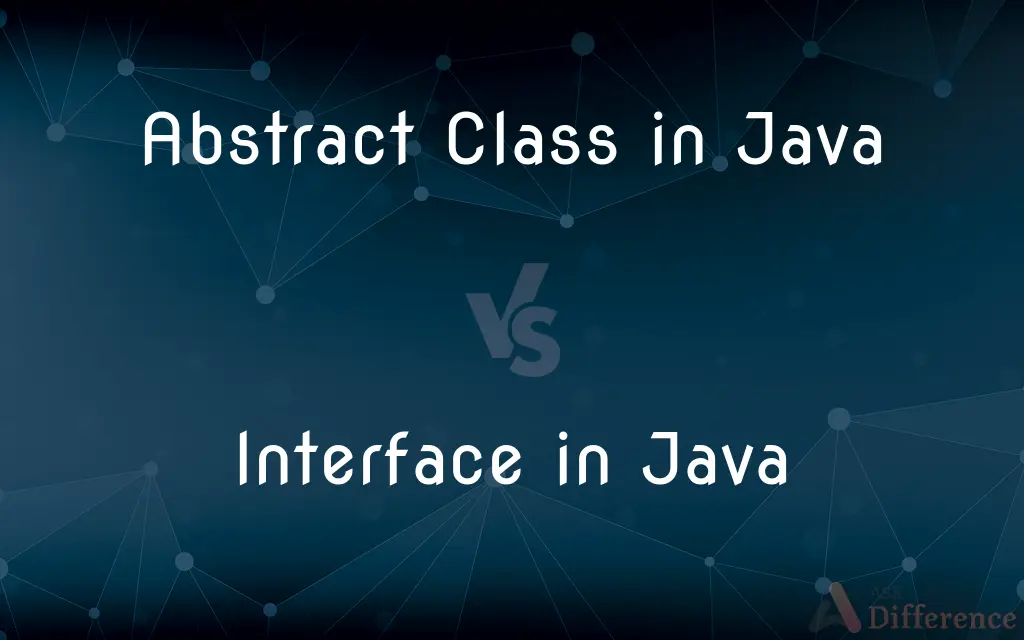Abstract Class in Java vs. Interface in Java — What's the Difference?
By Tayyaba Rehman — Published on January 3, 2024
An Abstract Class in Java is a partially implemented class, whereas an Interface is a fully abstract contract for classes to implement.

Difference Between Abstract Class in Java and Interface in Java
Table of Contents
ADVERTISEMENT
Key Differences
Abstract Classes in Java are used to provide a base class with common methods and attributes, which can be partially implemented. Interfaces in Java serve as a contract for classes, defining methods that must be implemented, but contain no implementation.
Java's Abstract Classes can have both abstract methods (without implementation) and concrete methods (with implementation). Interfaces, traditionally, could only have abstract methods, but since Java 8, they can also have default and static methods with implementation.
An Abstract Class can have constructors and maintain state through fields. In contrast, Interfaces cannot have constructors and do not hold state, as they are intended to define behaviors rather than state.
A class in Java can extend only one Abstract Class, enforcing a single inheritance model. However, a class can implement multiple Interfaces, allowing for more flexibility and avoiding the diamond problem.
Abstract Classes are used when subclasses share a common structure or behavior, whereas Interfaces are preferred for defining capabilities that can be provided by multiple unrelated classes.
ADVERTISEMENT
Comparison Chart
Implementation
Partial implementation, can have concrete methods
Only abstract methods (default methods allowed since Java 8)
State Maintenance
Can have fields to maintain state
Cannot maintain state
Constructors
Can have constructors
Cannot have constructors
Inheritance
Single inheritance (extends one abstract class)
Multiple inheritance (implements multiple interfaces)
Usage
Shared structure or behavior among subclasses
Capability definition across unrelated classes
Compare with Definitions
Abstract Class in Java
It allows partial implementation with both abstract and concrete methods.
Public abstract class Vehicle { public void start() { ... } public abstract void drive(); }
Interface in Java
A class can implement multiple interfaces.
Public class Car implements Drivable, Serializable { ... }
Abstract Class in Java
Abstract Classes enforce some methods to be implemented by subclasses.
Public abstract class Database { public abstract void connect(); }
Interface in Java
Interfaces define methods without providing their implementation.
Public interface Savable { void save(); }
Abstract Class in Java
Abstract Classes are used to provide a common template for subclasses.
Public abstract class Shape { public abstract double area(); }
Interface in Java
They cannot hold state and are used to implement polymorphism.
Public interface Drawable { void draw(); }
Abstract Class in Java
An Abstract Class in Java is a superclass that cannot be instantiated.
Public abstract class Animal { public abstract void makeSound(); }
Interface in Java
An Interface in Java is a contract for classes to implement specific methods.
Public interface Flyable { void fly(); }
Abstract Class in Java
They can have constructors to initialize common attributes.
Public abstract class Person { protected String name; Person(String name) { this.name = name; } }
Interface in Java
Java 8 allows Interfaces to have default and static methods.
Public interface Clickable { default void click() { ... } }
Common Curiosities
Can Interfaces have fields in Java?
Traditionally, interfaces cannot have stateful fields, but they can have static final fields.
What is an Interface in Java?
An interface is a contract that defines methods which implementing classes must provide.
Can an Abstract Class have constructors?
Yes, abstract classes can have constructors for initialization.
How many Abstract Classes can a Java class extend?
A Java class can extend only one abstract class.
What is an Abstract Class in Java?
An abstract class is a partially implemented class that cannot be instantiated.
Can an Abstract Class in Java have concrete methods?
Yes, abstract classes can have both abstract and concrete methods.
Can an Interface in Java have method implementations?
Since Java 8, interfaces can have default and static methods with implementations.
How many Interfaces can a Java class implement?
A Java class can implement multiple interfaces.
Can Interfaces in Java have constructors?
No, interfaces cannot have constructors.
When should I use an Abstract Class over an Interface?
Use an abstract class when you have a common base with shared state or methods.
Can Interfaces inherit from other interfaces?
Yes, interfaces can extend other interfaces.
Is it possible to have an Interface without any methods?
Yes, though rare, it's possible to have an interface with no methods, known as a marker interface.
Are Abstract Classes or Interfaces more flexible in Java?
Interfaces are generally more flexible due to multiple inheritance.
Can a class be both an Abstract Class and an Interface?
No, a class cannot be both; they serve different purposes in Java.
Can we instantiate an Abstract Class in Java?
No, abstract classes cannot be instantiated directly.
Share Your Discovery

Previous Comparison
Input Devices vs. Output Devices
Next Comparison
Yeast vs. MouldAuthor Spotlight
Written by
Tayyaba RehmanTayyaba Rehman is a distinguished writer, currently serving as a primary contributor to askdifference.com. As a researcher in semantics and etymology, Tayyaba's passion for the complexity of languages and their distinctions has found a perfect home on the platform. Tayyaba delves into the intricacies of language, distinguishing between commonly confused words and phrases, thereby providing clarity for readers worldwide.












































